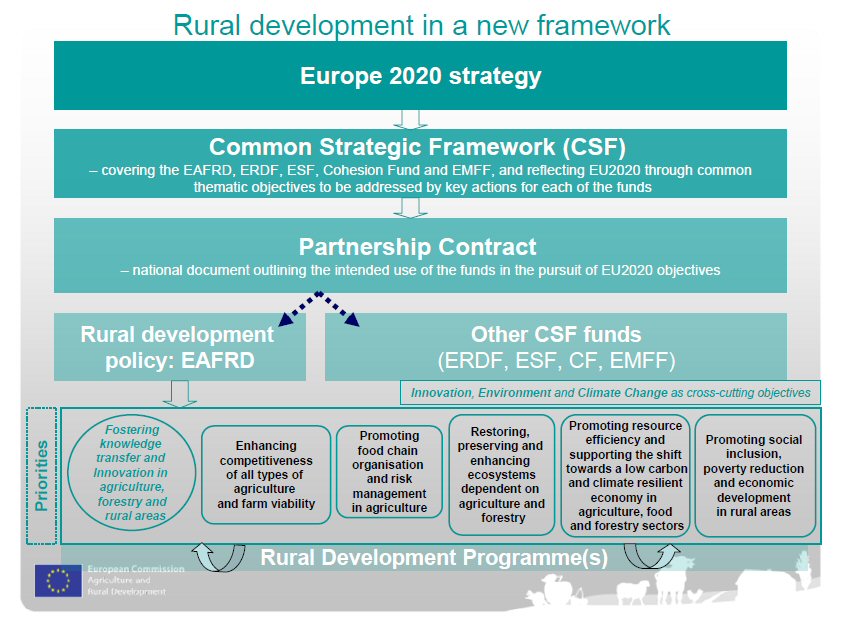The publication by the Commission of its second Draft Amending Budget (DAB No.2) to the EU’s 2015 budget this week reveals in stark figures the extent of the hiatus in CAP rural development spending caused by the delays in passing the relevant legislation and in approving rural development programmes. I first highlighted how approval of rural development programmes was falling way behind schedule in this post; the Commission’s budget figures now allow us to quantify the extent of the damage.
The delays do not affect only rural development programmes but all programmes under the European Structural and Investment Funds, the Asylum, Migration and Integration Fund and the Internal Security Fund. The Commission reports that 645 programmes need to be approved in total, of which 118 are rural development programmes. It estimates that 252 programmes (39%) were adopted in 2014, 93 (14%) are eligible for adoption on 2014 appropriations carried over to 2015, and for the remaining 300 programmes (47%) the corresponding 2014 appropriations have been left unused.
In order to make use of these unused 2014 appropriations, a revision of the 2014-2020 Multi-Annual Financial Framework (MFF) and the adoption of DAB No 2 are a necessary condition for the adoption in 2015 of the programmes which have not yet been approved and for which the 2014 allocation was not used. What the revision to the MFF does is to reschedule the unused commitment appropriations into 2015 and later years. For rural development, the Commission proposes to transfer the allocations not used in 2014 to 2015 and 2016. Payment appropriations are not affected.
Significant amounts are involved
The total amount of commitment appropriations to be rescheduled amounts to €21.0 billion in current prices, and total commitment appropriations in 2014 are reduced to €121.4 billion instead of €142.4 billion. Thus, 15% of the total EU budget was not committed last year because of these delays. The actual figure is even higher because the €21.0 billion figure does not include 2014 funds which were not actually committed until 2015 but which do not have to be rescheduled under MFF rules.
In the case of rural development spending, the MFF envisaged commitment appropriations of €13.97 billion in 2014 (in current prices). In fact, only €3.295 billion was committed under programmes approved in 2014. A further €1.97 billion is expected to be committed in 2015 under the MFF rules allowing carryover of 2014 funds. This means that the remaining €8.705 billion of unspent 2014 funds must be carried forward to future years.
In other words, 76% or three-quarters of CAP Pillar 2 funds available in 2014 were not committed in that year because of the legislative and programming delays although a proportion (14%) of the available funds can be carried forward under the MFF rules. The Commission is now proposing to reschedule the remaining 62% of the 2014 commitment appropriations equally to 2015 and 2016. The impact of these delays emerges clearly from the table below.

Payment appropriations are less affected
Perhaps surprisingly, payment appropriations (that is, actual reimbursements to member states) for rural development spending in 2014 do not show anything like the same fall. This is because nearly all of the 2014 spending was made up of payments under commitments entered into and schemes continued under the 2007-2013 MFF (only €1.2 billion out of the total payments of €11.591 billion related to commitments entered into under the new RDPs). The Commission seems also to have used the opportunity to reduce the unpaid balances owed to member states, so the payment appropriations figure may be a misleading indicator of the actual rhythm of payments to farmers under rural development schemes. One wonders how the Commission would have coped if RDP programmes had not been delayed and new RDP schemes had been opened to farmers in 2014.
The Commission lays the blame for the delay in approving RDPs on the late adoption of the MFF and the legal acts of the various Funds. It argues that its strategy to launch an informal dialogue with member states on the programming documents for the European Structural and Investment Funds as from 2012 achieved important results, and that the adoption of Partnership Agreements with member states took about four months less than in the previous programming period.
This is poor consolation to farmers unable to get access to RDP schemes, particularly agri-environment schemes, in the past year. The management of the programming process must be one of the items addressed in the Commissioner’s simplification agenda promised before October this year.
Update 24 January 2015. The Commission’s explanation of the transfer of unused 2014 budget commitments can be found here.
This post was written by Alan Matthews.

Europe's common agricultural policy is broken – let's fix it!

